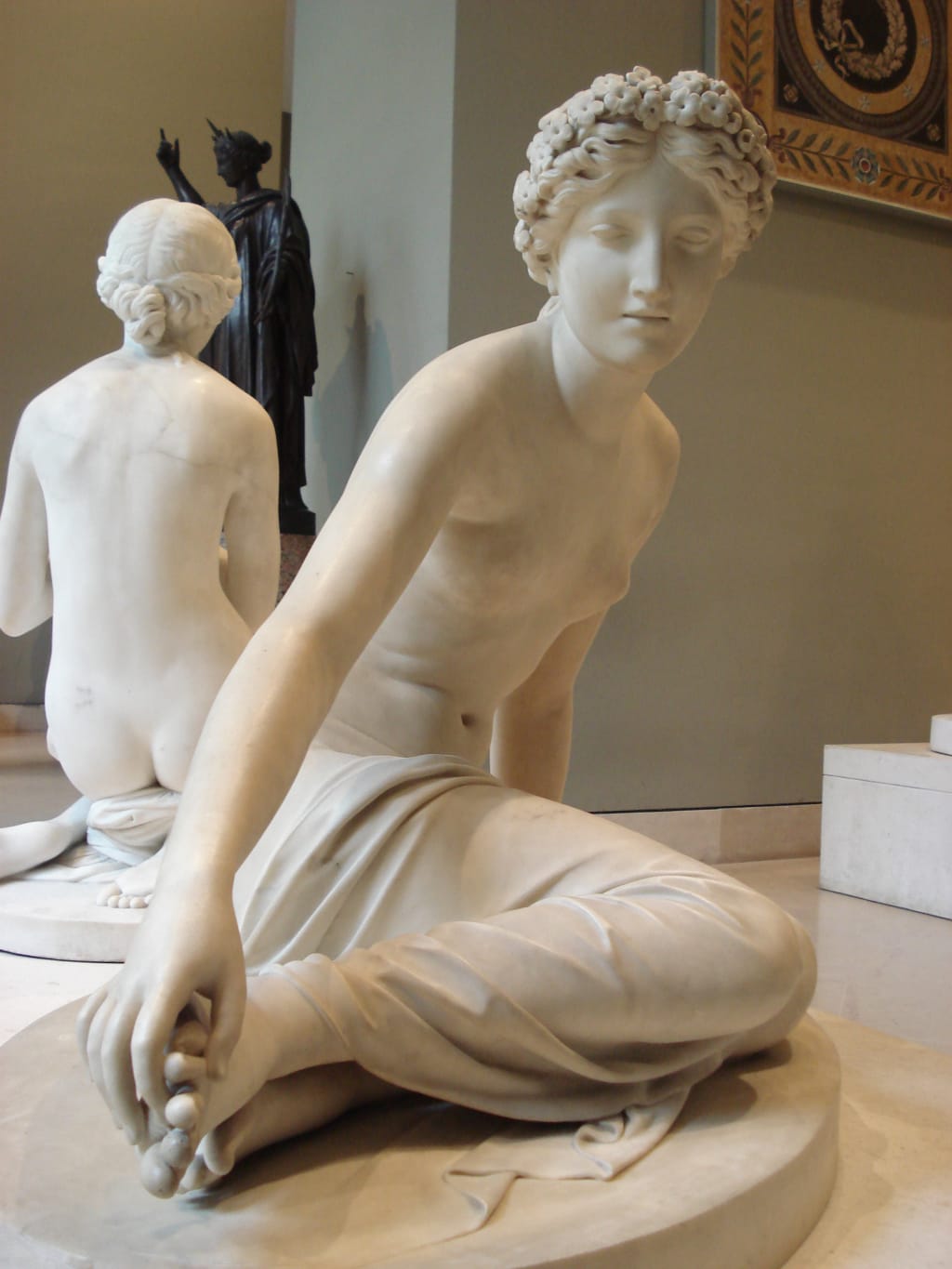A History of Transgender People, Volume II
Transgender Identities in Classical Civilization

In a time approximately 500-1500 years after the Mesopotamian cultures shared stories about Asu-Shu-Namir rescuing the goddess of love from the underworld, the Ancient Greeks had arisen, formed complex sea-spanning empires, developed a very silly beef with Troy, destroyed Troy, forgotten how to write, relearned how to write, but with a better alphabet this time, and wrote quite extensively about the stories they had told themselves when they forgot how to write.
In Greek myth, Salmakis is a nymph tangential to the nymphs of Artemis (herself not exactly stereotypically feminine), but one that Artemis didn’t really… know. In fact, the only one she didn't know. According to Ovid,
A Nympha dwelt there, not one to bend the bow or join the hunt or run to win the race; she was the only of the Niades unknown to swift [Artemis]. Many a time her sisters chide her: ‘Come, Salmakis, get out your spear or painted quiver; vary your hours of ease with hardships of the chase.’ Yet never spear she took nor painted quiver, nor would vary her hours of ease with hardships of the chase; but in her pool would bathe her lovely limbs, and with a comb of boxwood dress her hair, and, gazing long, take counsel of the waters what style were best.
Eventually, it seemed, “her essence” seeped into the waters and became a pool of femininity. Ovid's version of the myth state that Salmakis raped Hermaphroditos, but other sources disagree, similar to how Asu-Shu-Namir was two demons in Babylon, but a being both male and female in Akkad.
Salmakis had her magic spring that [was pure, feminine essence], and Hermaphroditos went swimming in it, of his own volition, and he drowned. Salmakis rescued him and begged the Gods for His life, so they merged Them into One.
From here my source, a classicist focusing on relatively obscure Hellenistic mythology and specializing in myths surrounding Aphrodite, begins to add her analysis to the story:
"Ultimately, I can't look at this narrative as 'Hermaphroditos accidentally estrogened'— that makes no sense to me. So based on all this evidence—that Their union was both consensual, groundbreaking and had a remedying effect on Hermaphroditos [Hermaphroditos was known for being... intemperate, and Salmakis' pool softened both the skin and the temper, in addition to giving you breasts and shrinking your genitalia]—I see the unified being not as just this androgynous God (like Agdistis), but as a Being that's both:Here my source pauses for dramatic effect having teased four parents but having given only three. I am, momentarily, envious of her storytelling skill.• intersex (because it's the fusion of Hermaphroditos' body with Salmakis) [i.e. both male and female]
• a trans woman (because in light of all the evidence it makes way more sense that Hermaphroditos became Salmakis, not the other way around)
...
Salmakis represents a perfect marriage [she is, after all, the goddess of marriage and possibly of vanity as well], because Salmakis represents a perfect union—one so perfect that the parties involved have become totally indistinguishable from each other.
So, being a simulacrum of an ideal marriage (from the Classical view), Salmakis has not two parents, but FOUR. Because when you get married, you have your parents, and you have your in-laws.
So, we know that Hermaphroditos' Parents are Hermes and Aphrodite (hell of a pedigree). We also know that Salmakis' Father was Maiandros, the God of the Meander River, which, btw, is a river so twisted that it formed the origin of the word "meandering".
Salmakis' Mother is Leto.
She hypothesizes
Look at those spheres of influence. Leto is a Goddess of Modesty and Womanly Demure, as well as a Goddess who answers the prayers of, let's face it, trans folks.
This requires a minor digression. In order to understand why trans people pray to Leto, we have to talk about Leucippus, the trans son of Galatea.
When Galatea was pregnant, Lamprus told her he would only accept the child if it was male, but Galatea gave birth to a daughter while Lamprus was away pasturing his cattle. Following the advice of seers, Galatea gave her daughter a masculine name, Leucippus, and told Lamprus that she had given birth to a son. Leucippus was raised as a boy, but as she reached the age of adolescence, it was becoming difficult to conceal her true sex, so Galatea went to the sanctuary of Leto and prayed that her daughter may be changed into a son....Leto took pity on Galatea and changed Leucippus' sex to male. In commemoration of this event, people of Phaestus surnamed Leto Phytia (from Greek φύω "to grow"), because she let Leucippus grow a penis, and established a feast in honor of Leto, which was called Ecdysia (from Greek ἑκδύω "to undress"), because Leucippus got rid of woman's clothes after his transformation. It was a custom for women of Phaestus to lie next to the statue of Leucippus before their wedding.
Leto is considered sympathetic to transgender people, it seems, and this is not the only attested example of this phenomenon, but perhaps the most literally transgender example, as Leucippus apparently stayed male, whereas most of the other examples changed back to their birth sex after they did the thing.
However, as it turns out, not only because of Leucippus.
How did Salmakis and Hermaphroditos become one? Salmakis prayed to the Gods. It was never said which God actually answered the prayer. [It makes a lot of sense that] Leto did it Herself.
Leto, a goddess to whom those unhappy with their gender appeal, a goddess, almost, that is a patron of transgender people, would be the ideal person for Salmakis to ask if she were explicitly asking her to make Hermaphroditos into a woman, but she was asking her to save him. She instead merges him with her.
My source explains to me that a god's children can be viewed fairly as a commentary on that god's particular bailiwick.
Here my source turns back to Salmakis.
Supposing that Salmakis and Artemis are half-sisters, they PERFECTLY represent one half of Leto's sphere and wickedly subvert the other half.Artemis is a Goddess of Modesty, but not of Womanly Demure—She's "of manly form", remember. She shuns sex and romance, but She's sporty, and athletic, and potentially spends half Her time presenting as a man.Salmakis is a Goddess of Womanly Demure—spurning those EXACT activities Artemis glorifies, and being utterly feminine. But She's the absolute OPPOSITE of modest. She's unrepentantly vain, and also, She has [male genitalia].Moreover, this would explain why Salmakis is so perfectly counterbalanced against Artemis, to the point of being literally unknown. She's literally the Yin to Artemis' Yang. Her unknown, younger, quieter, trans half-sister.[there is no small irony in the fact that many anti-transgender radical feminists identify with Artemis and] the irony is, of course, that Artemis' Mother is a Goddess of Trans People, the Mother of the Goddess of Intersex People, and that Artemis might well be a Trans Man themselves, or at least Trans Masculine a lot of the time.
This fascinating look into the incredibly complex religion of the classical Greeks stands at odds, it seems, with the incredibly misogynistic Greek culture. For example, Ovid's writing of the myth of Salmakis paints her as a rapist, having forced this curse of being trans onto Hermaphroditos.
The misogyny of the Greek city states is well-recorded. Xenophon, from whom we learn basically everything we know about Spartan culture, noted with some alarm that there were a powerful class of war widows who, because of Sparta's relatively egalitarian inheritance laws, even the Ephors and the Kings had to respect (and borrow money from).
The Spartan example, though, is interesting. Not only because Athenians got their chitons in a twist over rich Spartan women (and they did. The way the Spartans feared the Helots resonates pretty well against how the Attic states feel about women. To wit, they must be kept in their place or they will destroy us all), but also because Spartans considered themselves to be foreign occupiers. Not actually Greek. And as it happens, when Thebes won the Boetian war at Leuctra, Sparta went into long-term decline. The future of egalitarian treatment of women died on the field there, in the shadow of the Kithairon, not to be resurrected for an age.
In the next volume, we'll step a little bit outside of our relatively Eurocentric focus and explore gender and those who fall outside of its bounds in Pre-Christian Africa.
In case you missed it, please feel free to reach further back to the beginnings of recorded history, when writing was new, and discover the love of Ishtar for her savior in the Land Between the Two Rivers.
About the Creator
Sophia-Helene Mees de Tricht
I'm a socialist space penguin. I mean, I'm sure there are more important things about me, but I also don't want to be accused of misrepresenting myself, so let me just say that up front and loudly and clearly and oops! I'm about out of spa






Comments
There are no comments for this story
Be the first to respond and start the conversation.